Right now, Luka Jović might be leading the line for Entracht Frankfurt against Benfica in the Europa League, but he's also auditioning for a much bigger job.
Sunday June 2nd. Twenty-four hours removed from the Champions League Final, European football’s second season begins. Clubs across Europe take stock and evaluate. When they do so, there is only one name that will cross the lips of those searching for a new striker, Luka Jović .
Eintracht’s Serbian attacker has drawn many admiring glances in plundering the Bundesliga this season, firing Frankfurt into the hunt for Champions League football in 2020. He has managed 16 league goals from an expected goals total of 11.31, accounting for 25% of his team’s total in the process.
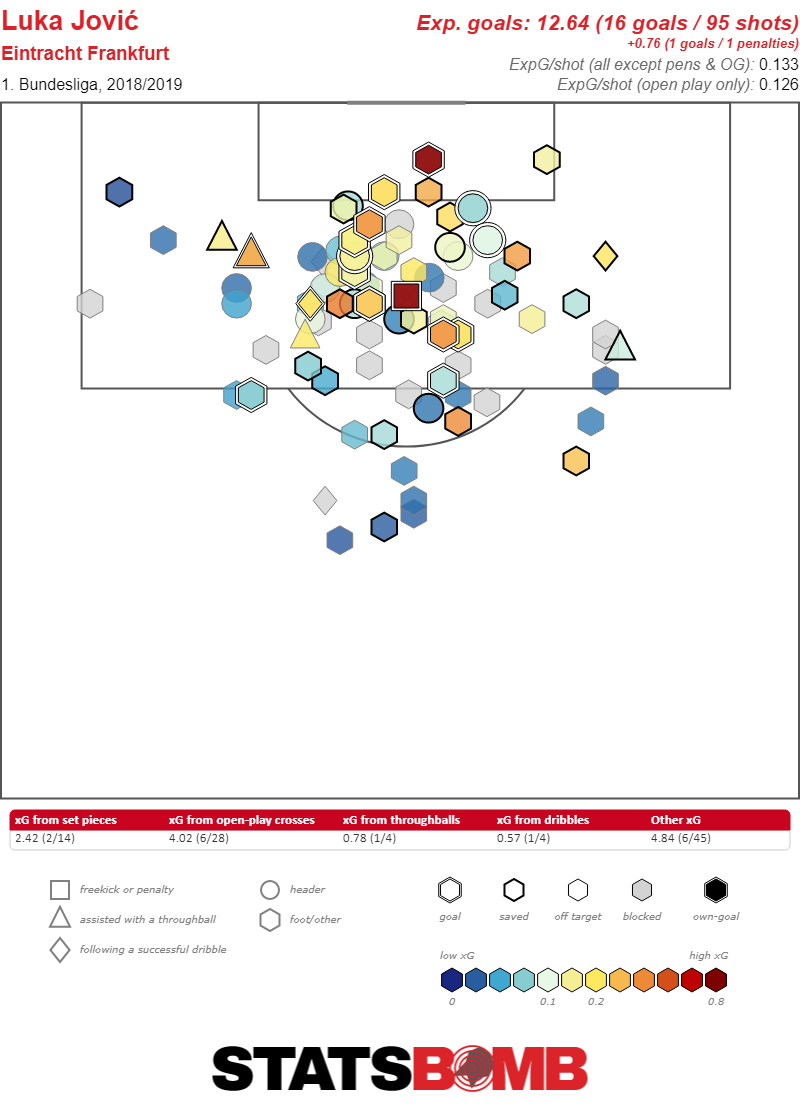
In Catalunya, Barcelona are rebuilding one final team around Lionel Messi. Latest signing Frenkie De Jong joins Arthur Melo, Ousmane Dembélé and Malcom (if he’s not shipped out) as youngsters who will be key figures at the Camp Nou over the next decade. Amongst these facilitators is the ideal landing spot for this prodigious striking talent.
Luis Suárez is an aging force, but the role he plays in allowing the Blaugrana and Messi to be effective often goes unnoticed. Jović’s feisty personality and central-centric playstyle are the most akin to the Uruguayan in Europe. Physically and statistically he would not have to make much of a leap to fill the considerable void of El Pistolero.
At 5’11 he is not overly big compared with the prototype centre-back of 2019, yet neither is Suárez at 6’0.
Jović takes up advanced positions, trying to play on the shoulder of the deepest central defender. In a Frankfurt team that has 251 less passes per game than Barça he still manages to register 12.71 touches in the box per 90 minutes as well as accumulating 3.21 deep progressions per 90, highlighting a willingness to get involved in the buildup before positioning himself in the box, something key to the Barcelona pattern of play.
Comparatively, this season Suárez has 15.34 touches in the box but fewer deep progressions (2.38) than Jović. The differentials are easily explained by the gap in possession figures between the sides and what Jović is asked to do by manager Adi Hütter.
Already adept at playing with his back to goal, Jović’s tendency to spin and move directly into the box after the layoff meshes well with Messi’s predilection for moving laterally in possession before playing passes between the opposition centre back and fullback for the Barcelona wingers to move onto. Visually, a lot of Suárez goals come from balls played across the box that he subsequently finishes, an observation backed up by his shot chart.
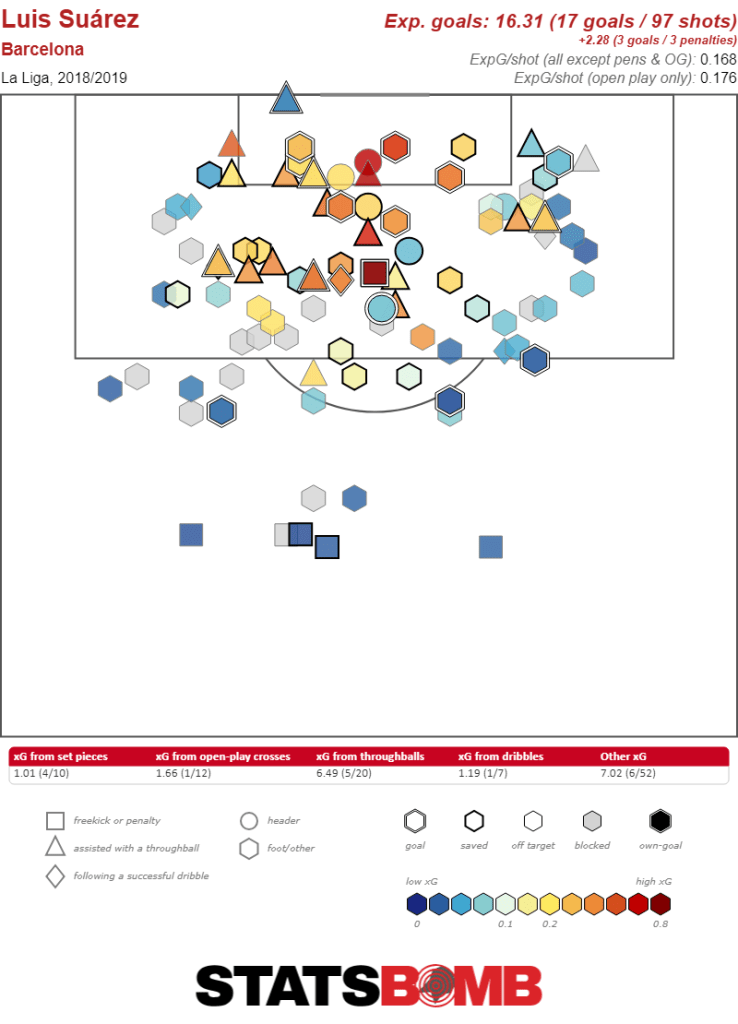
Jović doesn’t have quite the same tendency to end up virtually on top of the goal, but his shots still come from extremely central and dangerous areas, and it’s not hard to imagine that given the gift of receiving the ball from Messi, he too would pop up on the end of an endless barrage of tap-ins. The difference in location is why despite having the exact same expected goals per 90 (0.55), Jović’s comes from slightly higher shot volume 3.90 as opposed to Suárez’s 3.25.
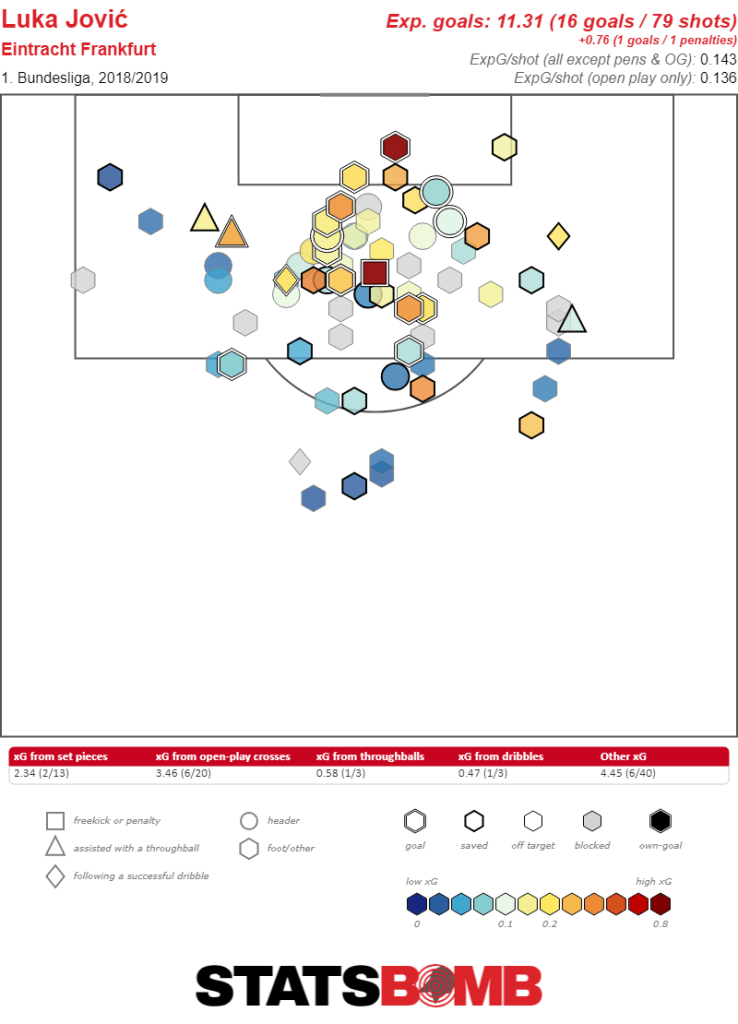
In defense, Jović’s youthful mobility and endeavor make him the perfect foil in the press quick and high system employed by the Blaugrana. While his current team are not particularly committed pressers (Frankfurt’s average defensive action takes place 44.35 yards from their own goals, five Bundesliga teams are more aggressive), Jović still acquits himself well.
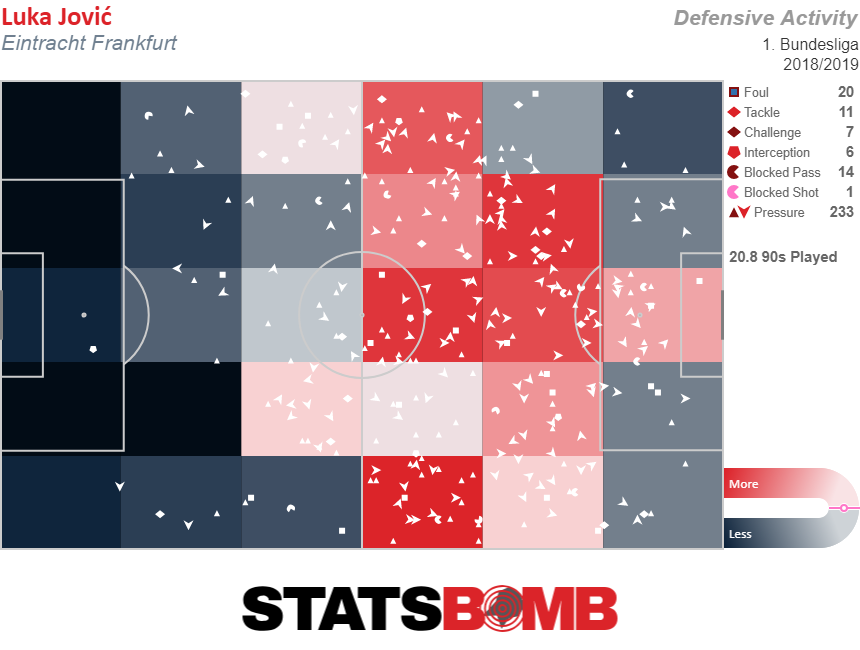
And while Suárez continues to fly around in Barcelona’s press, at 32 years old the perpetual pressing machine is the first thing that’s likely to slow down. As his movement declines it will definitely hinder Valverde in his attempts to impose a proactive pressing philosophy on the team.
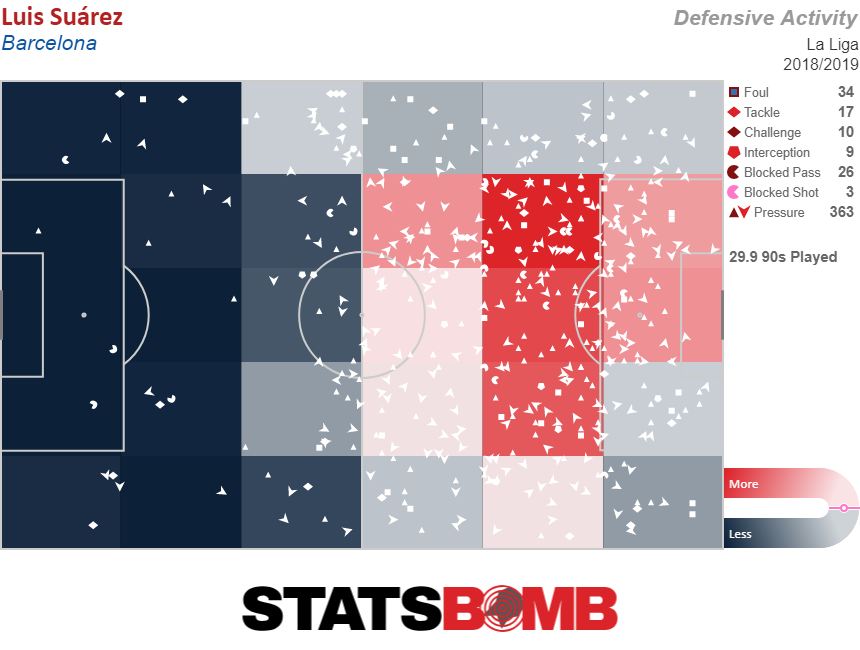
The biggest statistical gap between them is in aerial duels, where Jović completes four times as many as his Uruguayan counterpart but this can be put down to the German team having a more even split of possession with their rivals and a more distinctly direct style of play.
Moving away from the nitty gritty numbers, the striking similarities between the two are even more apparent. Suárez has excelled as one of Barcelona’s great central strikers by owning the area of the pitch between the box. He is rarely required to take up positions in the channel or move from outside to in, both of which would not be strengths of Jović’s game. He prefers to use his imposing muscular frame to promote verticality in the team movement.
Suarez has been lucky enough to be part of the greatest club team of all time with Messi, Neymar, Iniesta, Xavi et al and in their latest spending splurge, Barcelona are preparing to solidify that dominance once more before Messi leaves for his Argentinian swansong at Newell’s Old Boys (a romantic can always dream).
The current group will have a lot to do to emulate that vintage, but it looks as if Eric Abidal is trying to go as like for like in replacing some of his legendary former team-mates. In Jović he could have a plug and play replacement for a player that has given 129 goals in 159 games since arriving in 2014.
Eintracht are well aware of the growing interest in their prized asset with Bayern and Chelsea, if they dodge a transfer ban, also both sniffing around the Frankfurt stands. The asking price appears to grow exponentially with every goal, and may currently stand at 60 million euros, but you imagine it will come down to the players preference with all three teams having an endless bankroll.
If Jović does become Barcelona’s eighth signing aged 23 or younger in the last two seasons, there won’t be a team in Europe with a greater balance of youth, quality and depth.Brace yourselves for another period of sustained Catalan dominance at the forefront of European football.